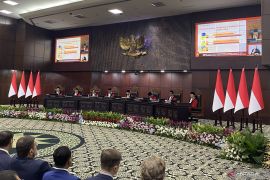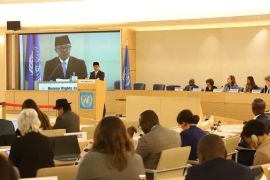The criminal code was drafted carefully by paying attention to the balance of the interests of individuals, the state, and the public, and by taking into account Indonesia's multi-ethnic, multi-religious, and multi-cultural condition, Deputy Minister of Law and Human Rights, Edward Omar Sharif Hiariej, said in a press release received on Friday.
In addition, the code was drafted after it went through a long process of public consultation, he added.
Indeed, the ratification of the new criminal code has been met with protest, especially concerning the issues of privacy, freedom, and human rights.
One of the issues concerns the adultery and cohabitation articles in the code.
The deputy minister said that the international community's reaction regarding the adultery and cohabitation articles was mainly caused by misunderstandings in the reading of the text of the criminal code.
He clarified that the adultery and cohabitation articles are complaint-based. Thus, a perpetrator can only be prosecuted on the basis of a complaint, which can only be filed by a spouse (for those who are married) or parents or children (for those who are not married).
The articles are aimed at protecting people from acts of arbitrariness, Hiariej added.
"When these articles are regulated in the criminal code, there would definitely be no raids," he said at a seminar at the Parliament Complex, Senayan, Jakarta, on Wednesday.
He explained that so far, there have been regulations in several regions based on which, officers of the Public Order Agency (Satpol PP) have carried out raids at hotels and inns.
After the articles are regulated in the criminal code and an explanation is provided, those regulations that are beneath the law will no longer apply, he said.
Meanwhile, spokesperson of the team tasked with disseminating the new criminal code, Albert Aries, clarified in a statement received on December 8 that the criminal code has not laid down administrative requirements for tourism players on questioning people about their marital status.
People's privacy is still guaranteed by law in Indonesia, of course, without reducing respect for the values that the country upholds, Aries affirmed. Therefore, foreign tourists and investors must not worry about visiting and investing in Indonesia.
In a statement received on December 9, the Tourism and Creative Economy Ministry said that it will conduct outreach to the domestic tourism industry to ensure there is no misleading information regarding how to treat tourists in response to a rise in misleading and false news regarding the adultery article of the new criminal code.
The ministry further informed that it will ensure that traveling in Indonesia is safe and enjoyable, and affirmed that the government is very respectful of guests and their personal matters.
According to the ministry, the purpose of the adultery article is to secure and not violate the private space of people, including visiting tourists and investors.
The rise in misleading and false news regarding the adultery article is deemed harmful to the tourism and investment sectors in Indonesia.
When contacted on Wednesday, a criminologist from the University of Indonesia, Adrianus Meliala, expressed optimism that the implementation of the cohabitation article will not violate human rights since it is complaint-based.
Regarding the ongoing public dispute, he opined that law enforcement officers must face the discourse with real actions.
Meanwhile, a professor at the Faculty of Law of the University of Indonesia, Indriyanto Seno Adji, said that the new criminal code is neutral and democratic.
"I consider the new criminal code to be very progressive, moderate, neutral, and democratic by considering and accommodating input from civil society, practitioners, and academics in law, even (includes) the representation of indigenous peoples as a meaningful form of public participation, which is in accordance with the mandate of the law," he said in a statement issued on Tuesday.
The adultery article, which is complaint-based, is a form of social control to prevent persecution, he added.
Besides adultery and cohabitation, freedom of expression and freedom of the press are among the issues that have attracted attention.
Regarding the issue of freedom of expression, Deputy Minister Hiariej said that the new criminal code makes a clear distinction between criticism and defamation.
He explained that critics must not be criminalized as they act in the public's interest in a democratic society, while defamation is deemed a criminal act in any country.
He further said that the criminal code maintains the freedom of the press as it adopts one of the provisions of the Law on the Press, which states that critics are a form of supervision or public scrutiny.
Meanwhile, Aries denied that the criminal code is not in accordance with human rights.
"It is not true to say that the Indonesian Criminal Code is inconsistent with human rights," he said in a written statement received on December 8.
The criminal code regulates everything by paying attention to the balance between human rights and human obligations, he added.
Aries emphasized that the criminal code does not discriminate against women, children, and other minority groups.
Then, to pay respect to the general law principles that apply universally, the criminal code has adopted the substance of the Convention for the Protection of Human Rights and Fundamental Freedoms (Treaty of Rome, 1950).
The code has also adopted the International Covenant on Civil and Political Rights (the New York Convention, 1966) and the Convention against Torture and other Cruel, Inhuman or Degrading Treatment or Punishment (December 10, 1984).
The Criminal Code Bill was passed into law on December 6, 2022, by the House of Representatives (DPR) during a plenary session of the parliament. In the session chaired by DPR deputy speaker Sufmi Dasco Ahmad, legislators unanimously approved the bill's passage.
According to Hiariej, the new criminal code was drafted to replace the colonial-era criminal code, which had been enforced in the country since 1918. The new criminal code is oriented toward the modern criminal law paradigm, which emphasizes corrective justice, restorative justice, and rehabilitative justice.
He added that there will be a three-year transition period before the code is applied, during which, the government will be open to communication and dialogue with stakeholders in order to improve the public's understanding of the new criminal code and to prevent misinterpretation of the code.
Related news: KPK questions president`s position on draft law on KUHP
Related news: UN letter on Criminal Code too late: deputy minister
Editor: Rahmad Nasution
Copyright © ANTARA 2022












